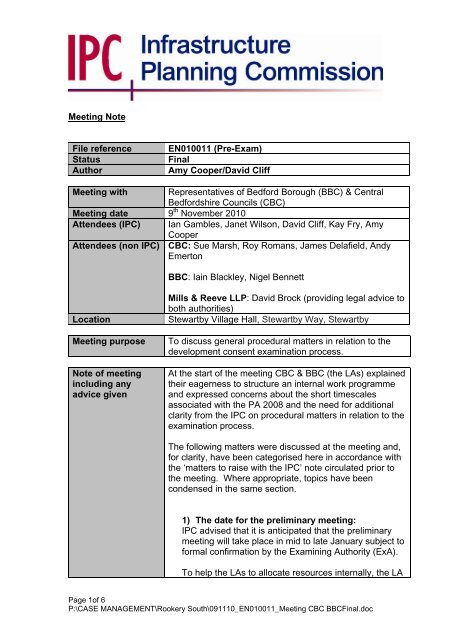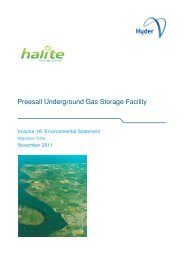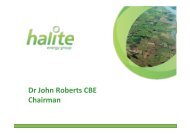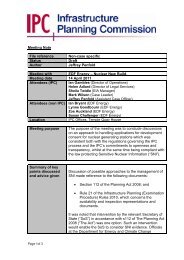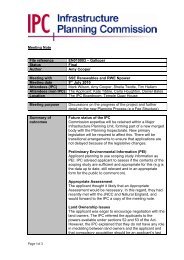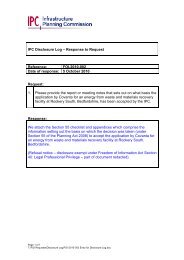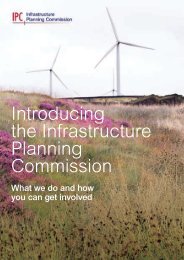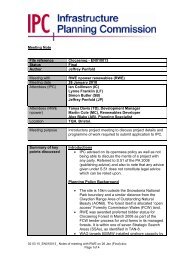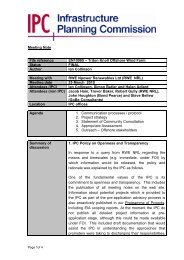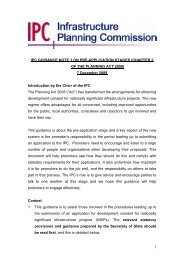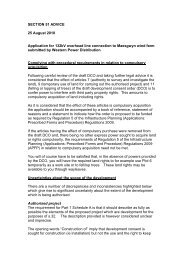Meeting Note File reference EN010011 (Pre-Exam) - National ...
Meeting Note File reference EN010011 (Pre-Exam) - National ...
Meeting Note File reference EN010011 (Pre-Exam) - National ...
Create successful ePaper yourself
Turn your PDF publications into a flip-book with our unique Google optimized e-Paper software.
<strong>Meeting</strong> <strong>Note</strong><br />
<strong>File</strong> <strong>reference</strong><br />
Status<br />
Author<br />
<strong>EN010011</strong> (<strong>Pre</strong>-<strong>Exam</strong>)<br />
Final<br />
Amy Cooper/David Cliff<br />
<strong>Meeting</strong> with<br />
<strong>Meeting</strong> date 9 th November 2010<br />
Attendees (IPC)<br />
Representatives of Bedford Borough (BBC) & Central<br />
Bedfordshire Councils (CBC)<br />
Ian Gambles, Janet Wilson, David Cliff, Kay Fry, Amy<br />
Cooper<br />
Attendees (non IPC) CBC: Sue Marsh, Roy Romans, James Delafield, Andy<br />
Emerton<br />
BBC: Iain Blackley, Nigel Bennett<br />
Location<br />
<strong>Meeting</strong> purpose<br />
<strong>Note</strong> of meeting<br />
including any<br />
advice given<br />
Mills & Reeve LLP: David Brock (providing legal advice to<br />
both authorities)<br />
Stewartby Village Hall, Stewartby Way, Stewartby<br />
To discuss general procedural matters in relation to the<br />
development consent examination process.<br />
At the start of the meeting CBC & BBC (the LAs) explained<br />
their eagerness to structure an internal work programme<br />
and expressed concerns about the short timescales<br />
associated with the PA 2008 and the need for additional<br />
clarity from the IPC on procedural matters in relation to the<br />
examination process.<br />
The following matters were discussed at the meeting and,<br />
for clarity, have been categorised here in accordance with<br />
the ‘matters to raise with the IPC’ note circulated prior to<br />
the meeting. Where appropriate, topics have been<br />
condensed in the same section.<br />
1) The date for the preliminary meeting:<br />
IPC advised that it is anticipated that the preliminary<br />
meeting will take place in mid to late January subject to<br />
formal confirmation by the <strong>Exam</strong>ining Authority (ExA).<br />
To help the LAs to allocate resources internally, the LA<br />
Page 1of 6<br />
P:\CASE MANAGEMENT\Rookery South\091110_<strong>EN010011</strong>_<strong>Meeting</strong> CBC BBCFinal.doc
asked whether the IPC can provide a steer on how the<br />
preliminary meeting will proceed including whether<br />
parties will be called upon to discuss matters at the<br />
preliminary meeting, noting that the minimum 21 days<br />
notice is constraining. IPC explained that notice of the<br />
preliminary meeting including an agenda of the matters<br />
to be discussed will be sent to interested parties (Rule<br />
6 of <strong>Exam</strong>ination Procedure Rules) following the<br />
appointment of the ExA and its initial assessment of<br />
issues. The matters to be discussed will be influenced<br />
by the relevant representations made by interested<br />
parties and will be a matter of the ExA to decide, not<br />
the Secretariat.<br />
2, 3,& 4) Timescale for the production of the Local<br />
Impact Report (LIR), Written Representations and<br />
Statement of Common Ground (SOcG):<br />
There is no statutory timescale for the submission of<br />
the LIR, the deadline for the submission of any LIR<br />
being a matter for the <strong>Exam</strong>ining Authority to decide in<br />
its procedural note to be issued following the<br />
preliminary meeting. The CLG Guidance on the<br />
examination process states that this should normally be<br />
received by the ExA within a six week period following<br />
the procedural decision. Interested parties will have<br />
the opportunity to make oral representations on the<br />
time they require to produce LIR, representations on<br />
SoCG at the <strong>Pre</strong>liminary <strong>Meeting</strong>. The preliminary<br />
meeting is the correct forum for this discussion.<br />
The LAs explained that, bearing in mind the Council’s<br />
decision making processes, it would be beneficial if the<br />
deadline for the submission of the LIR, written<br />
representation and the Statement of Common Ground<br />
could be the same. This was noted by the IPC but it<br />
was re-emphasised that this was a matter for the ExA<br />
to determine.<br />
The IPC did advise however that bearing in mind the<br />
likely timescale for the pre-examination stage, the<br />
deadline for submission of written representations was<br />
not likely to be before the end of January at the<br />
earliest, noting also the CLG guidance referred to<br />
above in respect of the LIR.<br />
IPC advised that written representations will be made<br />
available on the Commission’s website . A deadline for<br />
submission of comments on others’ representations will<br />
be set in the examination timetable.<br />
5) Time for completion of s106 agreement (s174<br />
PA 2008):<br />
Page 2of 6<br />
P:\CASE MANAGEMENT\Rookery South\091110_<strong>EN010011</strong>_<strong>Meeting</strong> CBC BBCFinal.doc
IPC explained that any legal agreement would need to<br />
be signed before the end of the examination period in<br />
order that is can be taken into account when the ExA<br />
makes its decision or recommendation.<br />
Representations from interested parties on any draft<br />
Head’s of Terms or proposed obligations from the<br />
applicant can be made through written representations<br />
or the LIR (for LAs). Whilst there will be opportunity for<br />
discussion at any specific issue hearing, interested<br />
parties should not assume such hearings will take<br />
place – the primary form of examination being by the<br />
means of written representations. The same advice is<br />
relevant to requirements. The LA s expressed a view<br />
that this could cause practical difficulties in coming to<br />
any conclusion on any legal agreements or<br />
requirements. (<strong>Note</strong>: Section 7 is also relevant to this.)<br />
6) The Draft <strong>National</strong> Policy Statements (NPSs) –<br />
Processes<br />
Given that the NPSs are due to be implemented at a<br />
time when this application is being examined the LAs<br />
questioned how the ExA will decide what weight to give<br />
to them? In addition, how will the examination proceed<br />
if there are significant changes to the NPS from its<br />
draft?<br />
IPC advised that the ExA will need to decide the weight<br />
that should given to any relevant draft NPS, in a similar<br />
way to how an Planning Inspector would need to give<br />
the appropriate weight to any emerging policy<br />
document in an planning appeal. Should significant<br />
changes occur during the examination process,<br />
consideration would need to be given by the ExA to<br />
whether further representations are invited from<br />
interested parties. This decision will obviously depend<br />
on what the particular issues are.<br />
IPC also advised that the Chair would be reluctant to<br />
extend an examination but has the power to do so<br />
under s98 of the Planning Act 2008. However should<br />
the Commissioner(s) and Chair feel that the changes<br />
between the draft and implemented NPS were<br />
significant and of relevance to the application, the Chair<br />
may choose to extend the examination.<br />
7, 9, 10 & 11) Hearings - Issue Specific Hearings /<br />
Identification of matters at the start of a Hearing /<br />
Council representatives at hearings / Oral<br />
Representations:<br />
IPC reiterated that the time for interested parties to<br />
make representations on whether any issues require<br />
Page 3of 6<br />
P:\CASE MANAGEMENT\Rookery South\091110_<strong>EN010011</strong>_<strong>Meeting</strong> CBC BBCFinal.doc
specific issues hearings will be at the preliminary<br />
meeting. The ExA will make its decision based upon<br />
the contents of the application, the relevant<br />
representations and oral representations at the<br />
preliminary meeting. Interested parties should not<br />
assume that specific hearings will take place on any<br />
particular issue.<br />
With regard to requirements and legal obligations,<br />
interested parties will have the opportunity to make<br />
representations on the merits of any particular<br />
requirement or obligation when commenting on a<br />
particular issue to which it relates.<br />
The LA’s wish it to be noted that it would be helpful for<br />
the ExA to inform interested parties of the matters to be<br />
considered, and those which it requires further<br />
information on, in advance of any hearing so that they<br />
can consider their response.<br />
In relation to who appears on the behalf of the LA’s at<br />
any hearing, the IPC explained that it would be<br />
appropriate for a person with the technical background<br />
relevant to the particular issue being heard to appear at<br />
any specific issue hearing. IPC also emphasised that it<br />
will be an inquisitorial rather than adversarial process<br />
more akin to a traditional Planning Hearing rather than<br />
a Planning Inquiry.<br />
Additionally, at the request of the ExA, the Chairman<br />
may appoint a person to act as an assessor (i.e. a<br />
technical expert in a particular field) to assist the ExA in<br />
its examination of the application (s100 PA 2008).<br />
The IPC stressed that the principal method of<br />
examination is the consideration of written evidence.<br />
The LA’s asked the IPC what it sees as the difference<br />
between a Specific Issue Hearing and an Open Floor<br />
Hearing? IPC explained that if one person requests for<br />
an open floor hearing, one will be held, whilst Issue<br />
Specific Hearings will be held if the ExA decides it to be<br />
necessary. All interested parties will have an<br />
opportunity, subject to the ExA’s powers of control over<br />
the conduct of the hearing, to make oral<br />
representations about the application. Those sharing<br />
the same views will be encouraged to put forward a<br />
spokesperson as the ExA is unlikely to allow oral<br />
representations repeating those that have already been<br />
made.<br />
The ExA will determine the time allocated for oral<br />
Page 4of 6<br />
P:\CASE MANAGEMENT\Rookery South\091110_<strong>EN010011</strong>_<strong>Meeting</strong> CBC BBCFinal.doc
epresentations based upon the relevant/written<br />
representations made and what particular additional<br />
information or clarification is required. The IPC notes<br />
that LA’s request for as much notice as possible to be<br />
given for the time allocated for oral representations.<br />
8) Appeals against refusal of requirements and<br />
s.121 of the Planning Act 2008:<br />
IPC explained that further clarification on the discharge<br />
of conditions is expected from the Government. The<br />
CLG Local Authority Guidance states that the<br />
Development Consent Order can include provision that<br />
allows the Commission to determine requirements in<br />
default of agreement by the Local Planning Authority.<br />
CBC and BBC advised that they would be inviting the<br />
IPC to apply existing statutory provisions to appeals<br />
against requirements. IPC responded that this would<br />
be clarified prior to this aspect of the process being<br />
applied. CBC and BBC advised that they would be<br />
considering the draft DCO with this in mind.<br />
The IPC invited the LA’s to submit to it in writing any<br />
questions and/or issues in relation to s.121 so that any<br />
matter can be carefully considered and a full response<br />
provided.<br />
12) What does the IPC understand by the Local<br />
Impact Report (LIR)?<br />
The IPC explained that the LIR provides an important<br />
opportunity for LA’s to provide their technical<br />
assessment of the likely impacts upon their area, using<br />
the LAs local knowledge and expertise. Further advice<br />
on the possible content of the LIR is provided with IPC<br />
Advice <strong>Note</strong> One. It is entirely up to the LA, however,<br />
whether they submit a LIR and what information is<br />
provided within it. Advice about the LIR remains<br />
generic with the intent to allow flexibility of it contents.<br />
13) Individual and Joint Submissions:<br />
IPC stated that groups or individuals may make joint<br />
submissions if they wish. For example, if a member of<br />
a public is a member of a residents group there is<br />
nothing to prevent that individual making their own<br />
representation along side the representation made by<br />
the residents group. However, some care will be<br />
needed. For instance, if a Parish Council submits an<br />
individual representation and then a joint<br />
representation with another Parish Council, confusion<br />
could result should the two representations contradict<br />
each other. This is a matter for each interested party<br />
to consider how best to make its representation.<br />
Page 5of 6<br />
P:\CASE MANAGEMENT\Rookery South\091110_<strong>EN010011</strong>_<strong>Meeting</strong> CBC BBCFinal.doc
14) Registration problems:<br />
The LA's indicated that they had been made aware of<br />
concerns raised by parish councils and others<br />
regarding difficulties of accessing and submitting<br />
relevant representation forms electronically.<br />
The IPC explained that the registration process has, for<br />
the most part, been progressing without any major<br />
problems. Remedies that have been introduced to<br />
resolve any specific problems including the provision of<br />
downloadable PDF copies of the registration form on<br />
the website should anybody have any difficulty with the<br />
‘captcha’ process. If any parts of a form submitted be<br />
incomplete, members of the secretariat are contacting<br />
people to let them know that they need to provide<br />
additional information. The decision to formally<br />
validate any representation as a ‘relevant<br />
representation’ is a matter for the ExA to determine<br />
following its appointment. Drop in sessions in the<br />
locality of the site have been held to provide guidance<br />
on the submission of the form and the IPC helpdesk is<br />
also able to do this.<br />
15) CBC and BBC submissions:<br />
IPC confirmed that the LA’s may submit their relevant<br />
representation form(s) by email should they wish.<br />
AOB – Future <strong>Meeting</strong>s:<br />
The LAs requested future meetings such as this to<br />
discuss procedural matters. IPC explained that<br />
dialogue within any future meetings must only discuss<br />
general and non case-specific procedural and process<br />
queries and not issues arising from the application itself<br />
– these being strictly matters for the formal examination<br />
process. Consideration to be given to the format and<br />
frequency of any future informal meetings.<br />
Specific<br />
decisions/follow up<br />
required?<br />
Circulation List<br />
• The LA’s are invited to submit in writing any<br />
questions in relation to s121 of the Act.<br />
• Consideration of any future ‘informal’ meetings.<br />
Attendees as listed<br />
Helen Adlard (Director or Legal Services)<br />
Peter Bond<br />
Page 6of 6<br />
P:\CASE MANAGEMENT\Rookery South\091110_<strong>EN010011</strong>_<strong>Meeting</strong> CBC BBCFinal.doc


